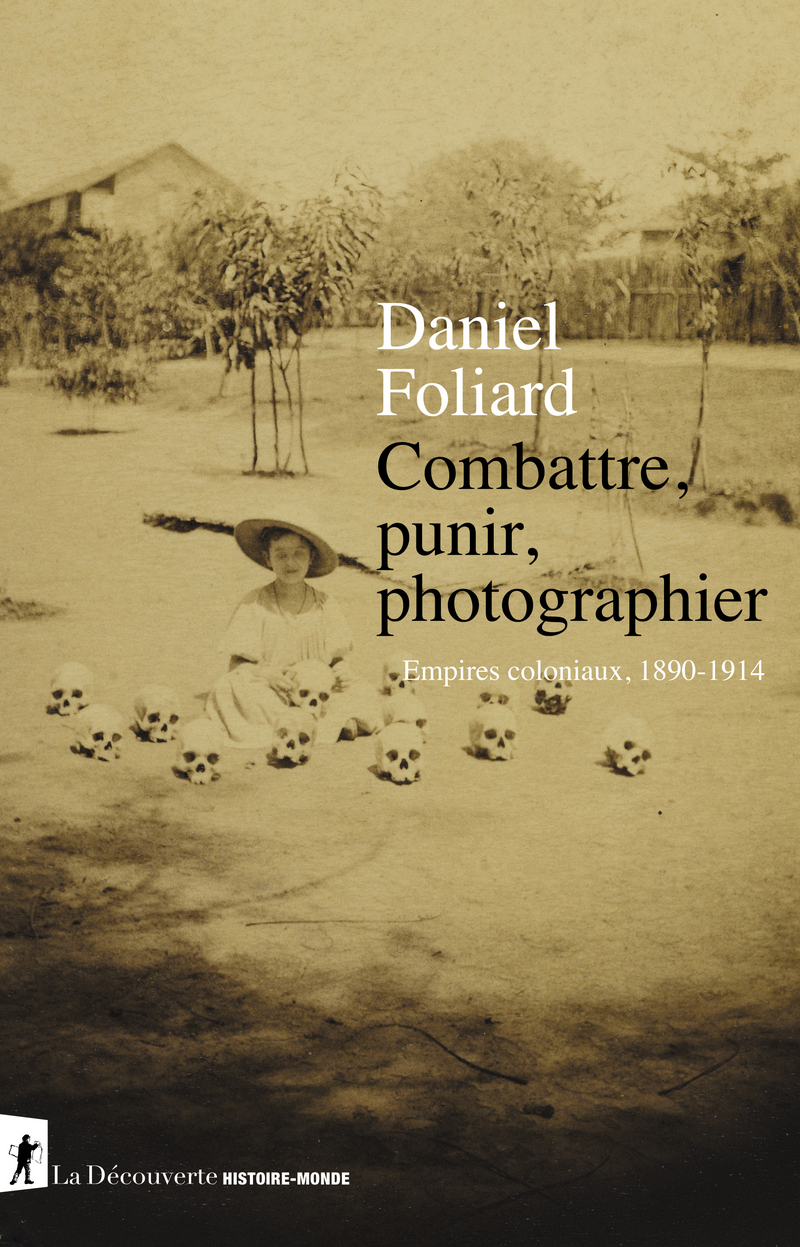Combattre, punir, photographier
Empires coloniaux, 1890-1914
Daniel Foliard
À l'évocation des mots photojournalisme ou photographie de guerre, la mémoire convoque des icônes dont les plus anciennes remontent aux années 1920 et 1930. On imagine ainsi que les conflits d'avant la Grande Guerre n'ont été que peints, dessinés et gravés ; figés dans un héroïsme un peu innocent avant que les violences du XXe siècle ne soient saisies sur pellicule dans leur réalisme cauchemardesque.
Des albums privés des soldats coloniaux aux fonds des premières agences d'images, ce livre, véritable archéologie de la photographie de conflit, est une invitation, et une éducation, à lire l'image-choc pour la désarmer plutôt que la subir. L'auteur se focalise sur les clichés de la violence physique et de la destruction armée, pris non pas comme de simples illustrations mais comme les supports d'une relation sociale. Dans ce monde de la fin du XIXe siècle, les conflits se multiplient de façon inédite et les abus coloniaux ponctuent les conquêtes. En les capturant, l'appareil photographique, devenu portable et abordable, transforme profondément l'économie visuelle de la violence, et ce bien avant 1914.
Au-delà d'une histoire des photographies des corps brutalisés et des violences armées, cet ouvrage, loin d'une pornographie du désastre, est aussi une proposition. Comment présenter des photographies montrant les atrocités indicibles pour les penser et en faire l'histoire ? L'observateur, y compris lorsque son regard plonge au cœur des ténèbres, peut retrouver dans les photographies les hommes et les femmes du passé, et non des victimes passives et anonymes figées sur le papier.

Nb de pages : 455
Dimensions : * cm
 Daniel Foliard
Daniel Foliard

 Actualités
Actualités

Extraits presse 

2020-09-01 - Sylvain Venayre - L'Histoire
Dans un essai brillant, Daniel Foliard livre une subtile histoire de la violence et de ses représentations. Le navire à vapeur, la quinine, la mitrailleuse : à ces outils ayant permis les conquêtes coloniales des Occidentaux à la fin du XIXe siècle, il faut désormais ajouter l'appareil photo. Telle est l'une des leçons de Combattre, punir, photographier, de Daniel Foliard, consacré aux images de violence issues des impérialismes d'avant 1914. [...] En refermant ce livre aussi puissant qu'exigeant, on ne regardera plus de la même façon les photos de violence, qu'elles soient historiques ou contemporaines.
2020-10-02 - André Loez - Le Monde
Bien avant la Grande Guerre, la photographie a représenté la colonie et la violence coloniale. Dans Combattre, punir, photographier. Empires coloniaux, 1890-1914, l'historien Daniel Foliard analyse brillamment le vaste corpus qui en témoigne, des albums privés des soldats coloniaux aux fonds des premières agences d'images.
2020-11-05 - Raphaël Gallien - Histoirecoloniale.net
Table des matières 

Introduction
1. Répulsions, effacements et pertes de contraste
La photographie arrachée
Problèmes de mise au point : fixer la violence
La violence : points de vue
Problèmes de focale : le monde hors de soi
2. La photographie comme force : pouvoirs et contre-pouvoirs
Pressions photographiques
Sortir du cadre : pouvoir aux sujets
Sujets démunis et humiliations en héritage ?
3. Profondeur de champ : la chambre noire au front avant les années 1890
Conflits insaisissables (fin des années 1840-fin des années 1850) ?
Expériences pionnières dans les contextes coloniaux (fin des années 1850-années 1860)
Armée et photographie : aux commencements
Tournant colonial et nouveaux usages (fin 1860‑1880)
Premiers effets de seuil
4. Les conflits armés face à l'objectif (années 1890-Première Guerre mondiale)
Modernités photographiques loin de l'Europe
Nouveaux angles
Années 1890 : porosités
1898‑1901 : clarifications
Années 1900‑1914 : une nouvelle économie visuelle
5. Le public et l'intime : régimes de visibilité
L'image pour soi : autour de deux albums de soldats du rang
Régimes de visibilité et expériences coloniales
Des angles morts insignifiants ?
Privatisations de la guerre : réflexions autour du Maroc
Gradations, censure et autocensure
6. Subversions, dénonciations et contournements
Images renversées
Photographier pour dénoncer
Questions d'échelles
Tendancieuses images
7. Corps ennemis
Corps recadrés
L'objectif et la punition : glossaire du châtiment
Des violences coloniales ? Le prisme de la photographie
8. Cimetières de papier
Souffrir et mourir au loin
Succédanés photographiques
Victimes invisibles versus visions du martyr
9. Guerres invisibles ? Reflets des conflits extra-européens en France et en Grande-Bretagne
Les guerres extra-européennes ont bien eu lieu
À propos de " cultures coloniales "
Un " vulgaire musée des horreurs " ?
Entr'apercevoir la guerre
Conclusion : Ceci n'est pas une illustration
Remerciements
Bibliographie
1. Documentation primaire
2. Documentation secondaire.












